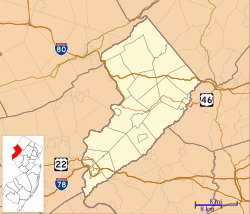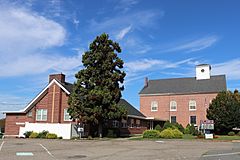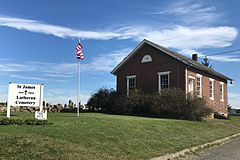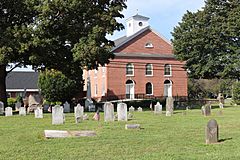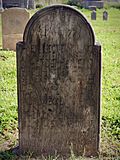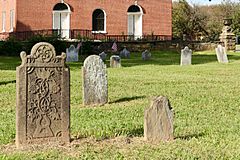St. James Lutheran Church (Pohatcong Township, New Jersey) facts for kids
|
St. James Lutheran Church and Cemetery
|
|
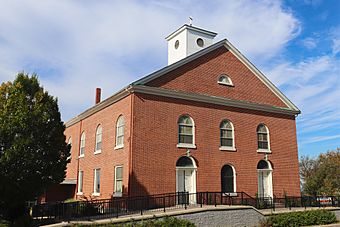
St. James Lutheran Church in 2017
|
|
| Location | 1213 U.S. Route 22, Pohatcong Township, New Jersey |
|---|---|
| Area | 2.5 acres (1.0 ha) |
| Architectural style | Early Republic (Federal) |
| NRHP reference No. | 16000737 |
Quick facts for kids Significant dates |
|
| Added to NRHP | October 24, 2016 |
St. James Lutheran Church, also known as Straw Church, is a historic building from 1834. You can find it at 1213 U.S. Route 22 in Pohatcong Township, which is in Warren County, New Jersey. Right across the street, in Greenwich Township, is the St. James Lutheran Cemetery. Both the church and the cemetery were added to the National Register of Historic Places on October 24, 2016. They are important because of their architecture and their connection to the early settlers of the area.
The Fellowship Hall, which is next to the church, and the old schoolhouse near the cemetery are not part of this historic listing. The one-room brick schoolhouse, built in 1858, is listed separately on the state's historic register.
Contents
History of St. James Church
The church community started around 1760. It was a "union church" for both German Lutheran and German Reformed Protestant settlers. This meant people from both groups worshipped there together.
The First Churches
People say the very first church was called Straw Church. It was a log building with a roof made of straw. This first church was built around 1767 in the area where the cemetery is now. A preacher named Christian Streit gave sermons here. He also preached at a nearby Lutheran church in Easton, Pennsylvania.
The second church building was made of stone. Its construction began in June 1790. The third church, which is the building you see today, was built with bricks. Its cornerstone, a special stone laid at the start of construction, is dated May 1, 1834.
Early Pastors
The first regular pastor who lived in the area started in 1769. His name was John Peter Gabriel Muhlenberg. He was the oldest son of Henry Melchior Muhlenberg. Henry is known as the "patriarch" or founding father of American Lutheranism.
The Cemetery's History
The cemetery has a low limestone wall at its front. A stone by the entrance gate has the date June 1790 carved into it. The oldest gravestone found there is from 1771. It is a brown sandstone marker for a child named David Metz. Another interesting gravestone is for Peter Heintz, dated 1777. One side of his headstone shows a "tree of life" design. An unknown German artist from Northampton County, Pennsylvania carved it.
What the Church Looks Like
The church building is made of brick. It was designed in the Federal style, which was popular in the United States after the Revolutionary War. The front of the church shows a special brick pattern called Flemish bond. The wooden tower on top, called a cupola, was added later in 1960. This building is the third church structure to stand in this exact spot.
Gallery
See also
- German Palatines
- List of Lutheran churches in the United States
 | Leon Lynch |
 | Milton P. Webster |
 | Ferdinand Smith |


